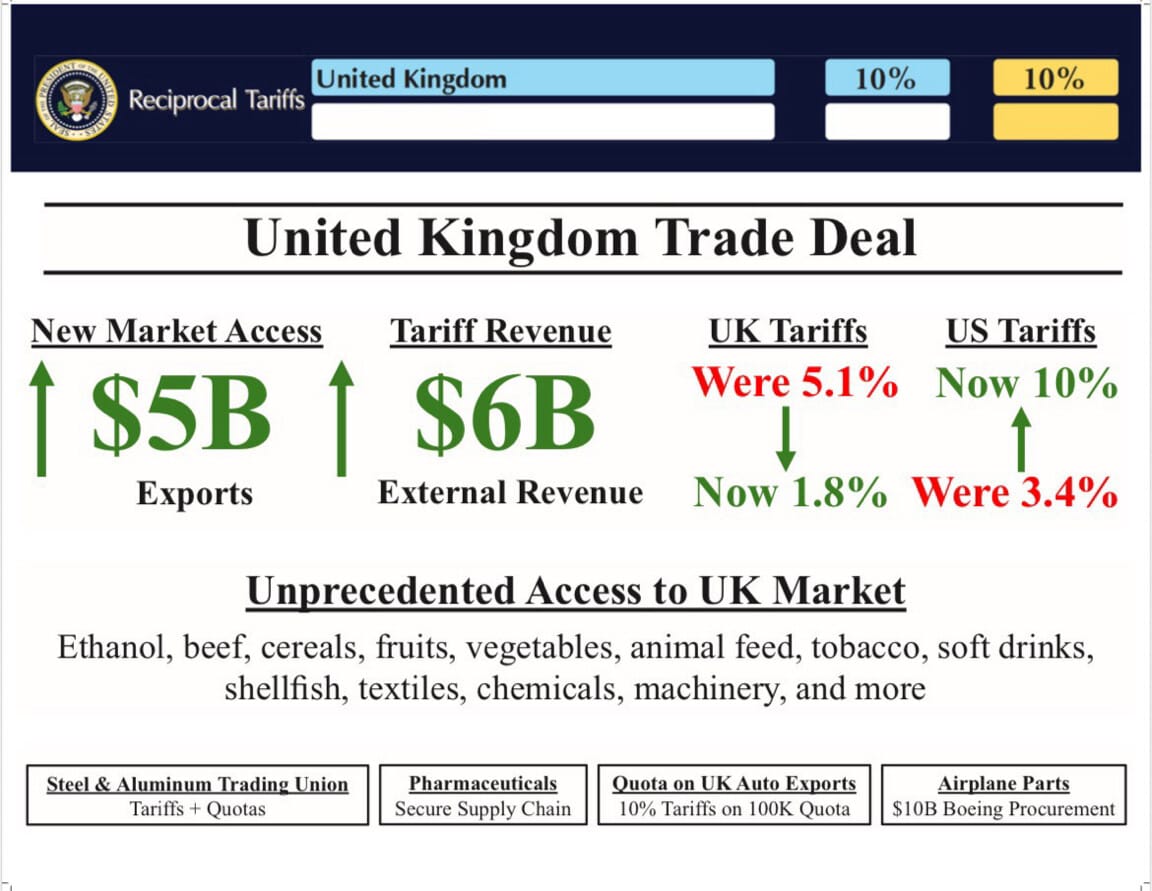Here come the "deals"
This isn't a trade war—it's a war on trade.

A few hours ago US President Trump inked a trade deal with the UK—the first since 'Liberation Day'—containing the following terms:
- US tariffs on British steel and aluminium will be cut from 25% to zero.
- US tariffs on an annual quota of 100,000 British cars will be cut from 27.5% to 10%.
- The UK will lower its overall tariffs from an average of 5.1% to 1.8%.
- The 10% 'Liberation Day' tariffs on everything else will remain in place.
Trump tweeted the deal in the form of a low-quality screen grab:

That was followed up with a fact sheet containing three headings and a few dot points, although the only tariff rates quoted were the country's respective average agricultural tariff rates, stated as 9.2% (UK) and 5% (US).
Now, I'm not quite sure from where the Trump administration got the 5.1% total average figure, or the 9.2% and 5% agricultural figures. But I suspect it's from the bottom of these World Trade Organisation (WTO) country reports (UK, US) that display each country's simple average tariff rates in 2022.
Not with each other, mind you; with the world. If the administration had bothered to go beyond the top Google result, they would have discovered that the latest WTO data show that in 2024 the UK's average tariff rate with the US was just 3.3%. On a trade-weighted basis it was just 0.9%—i.e. lower than the "deal" that Trump just signed.
UK agricultural goods are indeed tariffed at a higher rate—9.8% on a simple average basis—but the UK imports very few agricultural goods from the US (~$1 billion, or less than 1% of trade). That's mostly because of differing food standards: as in Australia, the UK doesn't take kindly to things like chlorinated chicken and growth hormones in its beef, and those food standards won't be weakened as a result of this deal.
In other words, it's unlikely that the 9.2% agricultural tariff was the barrier preventing US exporters from accessing the UK market, so even if it's lowered it's not clear that US farmers will benefit at all.
So, what are the key takeaways here?
Like Australia, the UK has a trade deficit with the US. With any luck that means we're probably going to strike our own "deal" sometime soon. But don't expect tariff-free trade: the 'Liberation Day' tariffs will likely remain in place, and any benefits Australian exporters get from increased market access in the US will almost certainly be smaller than what both countries lose from higher US tariff rates compared to the pre-Trump days.
Essentially, after all these "deals" get struck, all countries will have worse trade relationships with the US than they did on the day Trump took office.
The fact is Trump just hates foreign trade. In response to a question about slowing port traffic, Trump said "That's a good thing. That means we lose less money". He quite simply doesn't understand basic high school economics and believes that a trade "deficit" means the US is literally paying other countries and getting nothing in return, hence why he has declared war on trade.
Given that mindset, these "deals" are just a distraction from Trump's goal to maintain his tariff wall. Indeed, one estimate of the UK trade deal is that it will reduce US tariff rates by a measly 0.06%. The US will be a high tariff country for the foreseeable future.
Still, it's not the end of the world from a macroeconomic perspective. Imports are just 14% as a share of US GDP, and its economy should be able to absorb an across-the-board 10% increase in the prices of those goods—especially if paired with other policies that free up competition and ease price pressures elsewhere (I'm waiting with bated breath!).
But the biggest win with these "deals" is not that they improve trading relationships but that they remove considerable Trumpian Uncertainty. A few politically expedient goods are exempted, photos of politicians shaking hands get taken, higher tariff rates are locked in, and everyone can get on with their lives.
I honestly don't think we should have expected anything better.
Have a great weekend.





